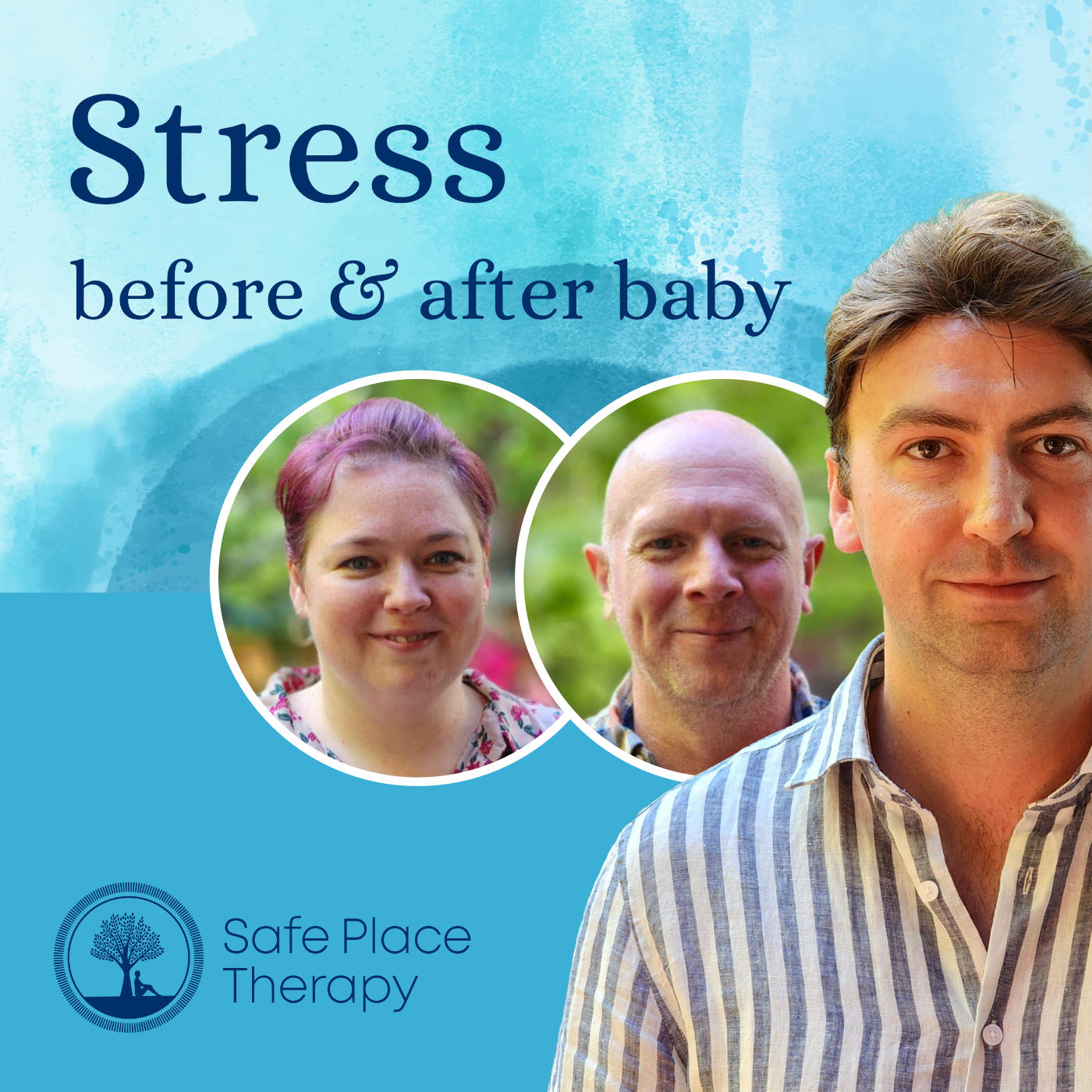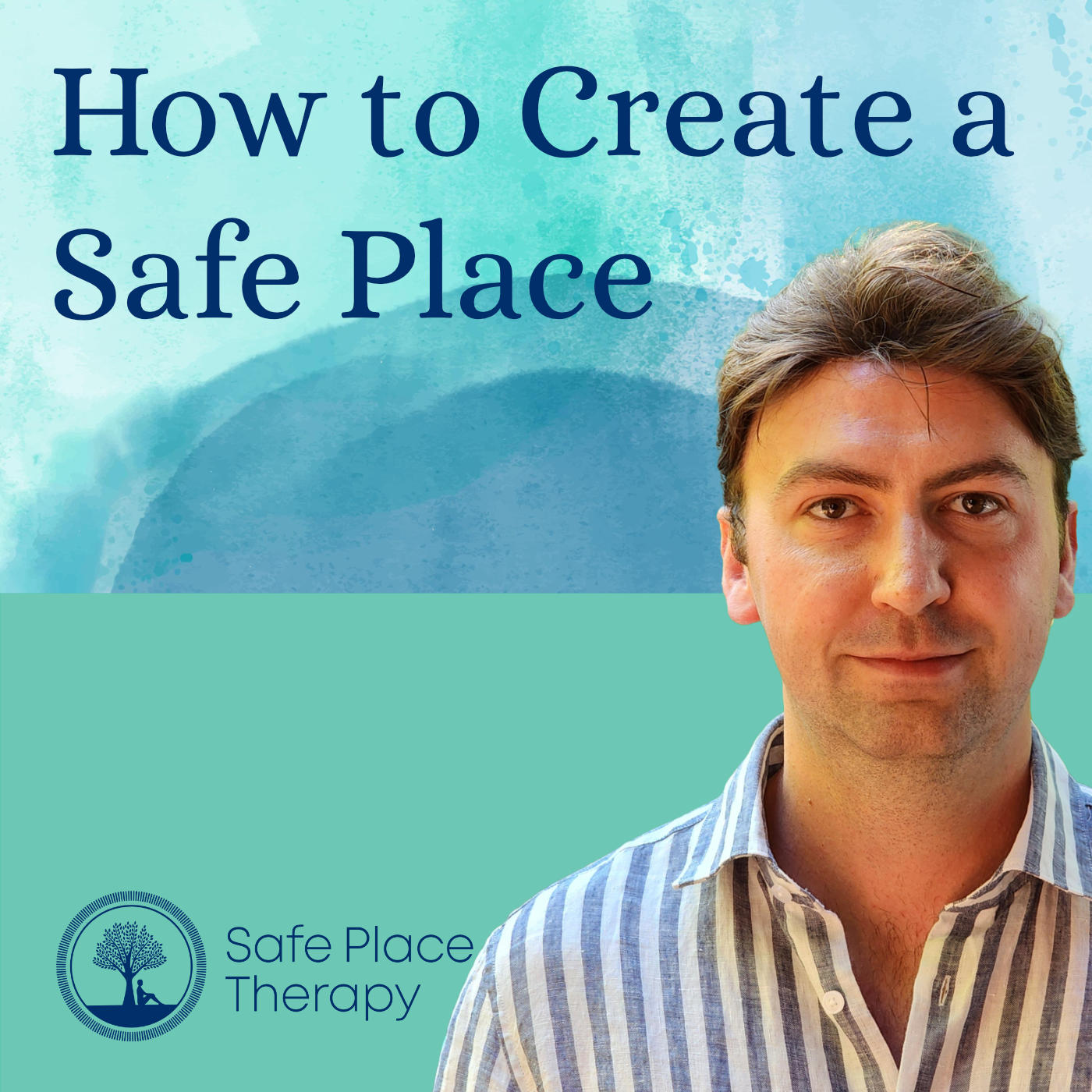Episode Transcript
[00:00:00] Speaker A: Foreign.
[00:00:06] Speaker B: Welcome, everyone. We're doing a video podcast today on new parents or a child coming along for a client or a couple, or they've just had a newborn and there is this kind of freak out that's happening for the family or for the client coming to see us.
So here we have Prue and Adam, who are counselors at psychotherapy and have experienced this themselves in terms of being a new parent, but have also worked alongside a lot of clients who faced this issue or this beautiful but kind of scary time in life. So welcome both of you.
Yeah, so let's kind of picture it. A couple or a client works, walks in, they might even have the baby in the front or the kind of, you know, quite stressed out, sitting down and kind of, you know, relate to you that a baby's coming or a baby's, you know, at home, newborn. I'm wondering what is the first things that you think need to happen in that first engagement, in that first kind of exploration of a baby's coming or a baby is here?
[00:01:20] Speaker C: I think it's kind of two different questions. There is the baby's coming versus the baby's here because it's kind of your internal resources will be different. Like you might have more capacity when the baby's coming to have a think about, you know, all sorts of different things, like, you know, shared parenting goals or beliefs and values, different things like that. Whereas when the baby's here, it's, you know, maybe more about, you know, pressure that you're putting on yourself or expectations about, you know, how you should be parenting, or the stress and the tiredness, sleeplessness, or changes in the relationship dynamic, how, you know, all of a sudden the self care tools that you had, you know, reading a book or going to the gym, you know, maybe those things don't exist for you anymore because you've got a newborn. So, I mean, there's kind of a few different things going on there. And I think it would depend on what the situation was for me or for a therapist to be able to cater to what, what was happening.
[00:02:24] Speaker A: Yeah, I think obviously everybody that walks into our counseling suites are different. So we want to understand what's going on for people apart from the immediate issues. It's also helpful for us to try to understand what are some of the kind of beliefs or expectations that people have carried, adopted or absorbed from somewhere in their life. Right. But that they've carried into the process of pregnancy and childbirth and becoming parents and so on. Those belief and those expectations will play a big part in the kind of. The experience. Right. The responses that they have, the emotions that they're feeling, especially over those first six months, 12 months, 24 months, when the stress, I think, on relationships is at a real high. Yes. Pru was saying, just the sleeplessness, the physical pain, sometimes the stress, the changes to our identity, changes to routine.
There's all the wonderful parts. And there's quite a bit of kind of loss and difficulty associated with those first two years as well. So. Yeah. So trying to understand as much of that background information as possible as well as kind of, you know, what's the issue that brings the person or the people into the room today? Yeah.
[00:03:37] Speaker B: So how about we sit with the babies coming example first?
I wonder what are some of the distresses you see? So they're, you know, they're in this kind of contemplative state of what is going to happen and the planning, I suppose, of what's next for them and Bubs and partner or the situation. Yeah. What are some of the common themes that come in for someone with a baby coming?
[00:04:03] Speaker C: I think. Well, there's a few things that I try and do with clients who are going to have a baby soon is I try and.
Because my therapy is a bunch of kind of practical things as well as kind of emotional things. So I will give, like, practical tools and also try and set up some infrastructure around. Okay, the baby's coming. Let's think about, okay, what. How much leave do you want to take?
How much support do you want to give to your partner? What's that going to look like? Start to kind of knock some of these things out where these things might have been.
Not conscious expectations about the way that things would go, but actually having people articulate. Okay, well, I actually would really like my partner to be around for four months as opposed to two weeks and. Okay, if that's what you'd like.
[00:05:01] Speaker A: Okay.
[00:05:01] Speaker C: How do we. How do we get you to talk to your partner about that? Or how do you set yourself up in a way that can make that work? Or maybe it can't work and you have to process the grieving of that because some people don't have the flexibility. So it's just trying to balance the, you know, hearing the concerns of the person and giving that space and also planning for some other things that they might not have thought about that I am aware of because I'm a parent. So, you know, have you thought about X, Y and Z? Okay, you haven't? All right, let's. Let's. Let's tease that Out. Let's, let's. So it's not a surprise when they actually come to that point and they kind of are like, okay, I'm a stay at home parent and I don't know who I am anymore. So that it doesn't get to that stage because we've kind of integrated some meaning and some enjoyment and some self and identity into that process.
[00:06:02] Speaker A: Yeah, I really agree with that. I think it's a balance of the sort of reflection about sort of practical issues and practical planning with all of the internal stuff that's going on for one or two people going into the process. I'm always curious to draw out in the first few sessions, you know, what are both people thinking?
That's a broad category.
[00:06:25] Speaker C: Right.
[00:06:26] Speaker A: That's kind of beliefs and thoughts and ways of thinking and so on. What sort of memories might be activated for a person, what sort of expectations they have for the future and so on. But what are both people thinking? What are they feeling and what do they need? And to draw out those things, there's going to be points of agreement there, there's going to be points of disagreement. That's okay. We can work through those things, sometimes find resolution or sometimes have to agree to disagree or be okay with the difference. But yeah, that balance of sort of the practical and the experiential.
[00:06:57] Speaker B: Yeah. And back to your point, Pru, when you haven't been a parent before, sometimes you can see something from one, one way or one perspective. And if you haven't, you know, haven't talked to other parents who've got kids or maybe there's a fear factor of I have doubts about blah. Right. Or I don't know about this situation and having that kind of chance in therapy, opportunity and therapy to go, you know, what's your, what's your thoughts about, you know, dad staying at home more than mom or, or, you know, grandparents. Involvement with child care, like having that kind of removed person outside of the picture can really help flesh it out a bit more.
[00:07:37] Speaker C: Hey, yeah, yeah. And just pose different questions that they might not have thought of and, and have a chance to be able to really. Yeah. Like nut it out and kind of make it a bit more clear and concrete in people's minds.
[00:07:53] Speaker A: One area that I have in mind when I'm meeting with parent or parents for the first time, the kind of expectations, the sense of, sense of pressure or stress that they feel, it is just socially there's an incredible amount of pressure and I think either real judgment or perceived judgment about being the perfect parent Getting everything right, not knowing everything.
And there can be this really natural sensitivity, I think, to a sense of judgment or a sense of kind of failure and getting things wrong. So at some point in the first few sessions with parents or to be parents, I kind of want to acknowledge some of that stigma, some of the pressure and expectation and just try and find out what the person's experience of those things are. Ideally to try to reduce some of those difficulties and kind of build in some resilience and preparation going forward and.
[00:08:56] Speaker B: Normalizing some of that stuff, this stress and generalizing here. But a lot of mums who've come to see me is, you know, they've got a picture in their mind of a friend who's doing an amazing job and you know, just looks really easy or just, you know, like life, life is exuding and you know, they've got a smile on their face all the time and you know, that's not going to be me. And just kind normalizing that. Okay, you might be seeing a nice pretty picture there, but that's not always the case or, you know, when we close that door, we don't know what's there.
[00:09:29] Speaker C: Yeah, yeah, absolutely. Because people can be quite, or some people can be quite performative about being parents and wanting to kind of appear to have everything together and you know, normalizing that and saying, you know, often a lot of people don't and a lot of people have struggles and that's okay. There's nothing wrong with that. It's actually good to ask for help and to be able to communicate with the people around you if you're struggling and to be able to accept help. I think that's a really big one for a lot of people is asking and then accepting help is, can be a real struggle.
[00:10:09] Speaker B: Yeah. So I guess further to that, you know, usually I think it's safe to say that a baby equals change in word, changing dynamics in a couple, changing family, changing all those things. How do therapists sit with change? How do we kind of prepare people or help people with that, with that big life change?
[00:10:36] Speaker A: Yeah. I would say we want people to notice and acknowledge and to find ways to be okay with the change even when it's difficult or distressing.
I think people have to different levels some sense that life is going to be different.
And so I think without preempting what people might understand about that or what different types of change different people might experience, we just want to explore it. I think the more we can help people be mindful and thoughtful about what life is like now and what it might be like going into the next chapter. Yeah, that's. That preparation can be really protective and helpful.
[00:11:23] Speaker B: And then I'm curious about a couple perspective. You know, either a couple's coming to see you or one parent is coming and there is this real worry about the difference in parenting styles or how they see, you know, kind of the parent relationship and how to do different things. I wonder how you navigate that.
[00:11:48] Speaker C: Yeah, there's a couple of different points there.
One, one point is the, the relationship and the changes that happen to the relationship. And I think I'll let Adam talk a bit more about that because that's kind of more of his area of interest. But also the, the point of what you were saying about the, the difference in parenting. And, and that's something that I would say. If the baby is coming, the baby's not here. That's conversations that should happen before the baby arrives. Okay, so what do we think about kind of discipline or what do we think about, you know, TV watching or bedtimes or schedules or, you know, and, and trying to nut out some of the more common disagreements that happen between couples in terms of the parenting and then getting people on the same page or finding some middle ground, finding some compromise. Yeah, so there's kind of a couple of different kind of things going on there, but I think the.
I'll leave it up to Adam to talk a bit more about the potential toll that it can take on a relationship or how to kind of navigate that.
[00:12:57] Speaker A: Yeah, I think to start with, a heap of research and data shows that the first year to two after having a child is easily one of the most stressful moments of any long term relationship.
So. And we can understand why that's the case. But I think that can manifest in sort of many different ways. But two, obviously different ways. One, it can be, it can result in conflict, so disagreement, you know, resentment, frustration, you know, who's been doing more of the work. It's actually quite common for two people to both have the perception and the feeling that their partner is not lifting their weight.
So the tension and the stress that comes with all of the change and types of loss after childbirth can lead to conflict and sort of turning against each other. And it can also lead to disconnection and turning away from each other.
One description of that that seems to resonate for a lot of people when I share it is that a couple can go from being these two people who are deeply enmesh in each other's lives and attuned to each other, sharing everything. And then at some point, this adorable little blob comes along. And over time, these two people become these two people that are basically sharing the jobs or divvying up the jobs of who's going to do what from day to day. So there can be this real disconnect. Sometimes people say it kind of feels like we're just good friends now or even just housemates, you know, sharing this responsibility. So. So in both of those directions, the path to trying to navigate those things is communication. Again, inviting both people to just be noticing and naming as much as possible. What are they thinking, what are they feeling and what do they need? Supporting, understanding between each other, problem solving as much as possible when it's possible and there's a lot of good options there and sometimes finding ways to accept or make peace with the things that are just different now, the things that can't be changed easily between two people.
[00:15:10] Speaker B: Yeah. So I think that really gives us a nice segue. We fast forward to, you know, babies here and they're turning up with baby in the pram or, you know, babies at home with, with, with grandma and that the couple are coming to see you or the mum or dad are coming to see you.
I wonder what the difference is there or the, the sense that you. We need to do. As a therapist, when you see that kind of dist.
That, that not coping.
[00:15:38] Speaker A: I suppose for me, in those first few sessions with a person or people in that situation, I want to hear as much of everybody's experience as possible to provide as much kind of care and validation and reflection as possible. It is difficult. And even when I'm sitting facing parents where there's agreement in the room that they're kind of not struggling or they've made some mistakes, they've done some things that they, that they think they should have done differently, just, you know, as much kind of. I want to do as much as possible to express care and validation and understanding that this is a difficult situation. You're doing your best and it's okay to notice and accept that there's some things that you need to do differently going forward and that can apply to the parenting responsibilities, that can apply to the relationship and finding ways to nourish the relationship during this really stressful time. And it applies to sort of self care as well.
Again, everybody can know, oh, life's going to be different when baby comes along. The reality can be, you know, so much bigger than just that. There's still a lot to learn.
It's also true that basically the more stressed we become, the less easy it is to consciously practice mindfulness and self care and to be thoughtful and to notice just how stressed or overwhelmed we are. So, so I think a lot of the work after baby comes is a bit of a check in or a bit of an audit about how's everyone going, what do you need? Yeah, how's the experience been?
[00:17:11] Speaker B: Yeah. And I guess one thing you're kind of touching on there, Adam, is, is, is there flexibility at home, right? Like is it possible for there to be a bit more tag teaming or is it actually okay to ask that really good friend to help out? Well, while mum or dad have a, have a snooze, have a nap, is it okay to order in dinner, right? So because we're sick of, we're sick of cooking and you know, literally just don't have the brain space for that. So that sense of movement, that sense of, you know, this shitty yucky thing is going on, what can we add to that that will help? What can we do differently or even see differently to make life just that little bit easier?
[00:17:53] Speaker C: And having another person's brain, like having a therapist brain to be able to say, okay, well you know, you, you're putting these really high expectations on yourself, you know, could it be that you could do it a little bit differently? Like and then having actual ideas about how that might work and suggestions and yeah, it can help to. Especially when people are tired and overwhelmed, you know, your brain's not functioning properly and you're not able to access kind of your problem solving skills as well as you would normally. So to have another person present to be able to say, oh, have you thought about that? Or have you considered that can be a really useful thing?
[00:18:32] Speaker A: I think the problem solving suggestions, you know, encouragement, part of counseling, that is the tools in our toolkit. If you like some people that walk in the door, that's exactly what they want.
I think a lot of other people that we meet, we might get to problem solving and strategies and flexibility around practical arrangements inside a house, in a relationship, for a lot of people there can be distress or hurt or shame, all sorts of difficult internal things that are happening, which might be more of a priority for people and which might actually be the things that are getting in the way of that practical problem solving.
And again, those are exercises in kind of reflection and practicing insight and they require skills in expression and communication and non defensive responses between two people. So. So I think yeah, the practical problem solving will often be part of it for some people. And there's all these other parts which often, you know, nobody teaches us, a lot of us, how to do that sort of reflection.
Yeah. And the noticing and naming of emotions in particular. I think that's really helpful part of what we do.
[00:19:50] Speaker B: Yeah. And. Yeah. Creating that space in the counseling space for, you know, any kind of yucky thought that. Or feeling going through that person's head, like, you know, I can't tell you the amount of times where a parent has said, you know, I feel like a really bad mom, or my. My kid needs more from me, or we're stuffing this up, you know, that are a real common language for. For lots of parents jumping in the deep end of. Of having a beautiful little bundle.
Yeah.
[00:20:26] Speaker C: There's just so much pressure that people put themselves under, and then the emotional impact that that has is significant. Yeah.
[00:20:34] Speaker B: What about people that are particularly isolated, like, they might not have, like, family. They feel kind of cut off from, you know, the help or, you know, the extended help outside of the house. Is there some ideas there or some things that are important to focus on there?
[00:20:52] Speaker A: In the first instance, people are remarkably resilient and capable.
And at the same time, everybody has a natural limit of the kind of stress or responsibility, practical tasks, you know, emotion regulation. Everybody has, like, a natural limit to this stuff, even people whose job it is to be really good at it. So I think, yeah, again, some of that acknowledgment and validation is really important.
We are not sort of magicians, and the people that we meet with don't have unlimited access to everything that they need in the world. So. And so again. But that sort of brings me back to resilience. I think people can find ways to deal with really difficult and not their situation, including, you know, like a practical support that other people might have. They can find ways to deal with that, to make the best choices that they can, you know, in the situation that they're in and to process the difficult thoughts and feelings that come from that.
[00:21:52] Speaker B: I wonder about your experience about, again, parents having a kind of an escalation of their mental health. So. So I kind of moving from, you know, I guess the. The broad range of stress and lack of sleep and conflict to someone where their anxiety is really blowing up or there's, you know, postpartum depression or kind of significant things going on there.
I wonder what's your encouragements there for. For people going through that just to.
[00:22:23] Speaker C: Kind of get support sports where possible. I mean, I would deal with that the same as a regular client that I would see on a day to day basis. You know, anything can tip someone over into a more serious mental health issue. That could be parenthood or that could be trauma or anything. So I would just kind of work with that as I would normally. I don't think that's a very clear.
[00:22:49] Speaker A: Answer, but yeah, yeah, yeah. I mean, partly it speaks to the need to try to do that assessment process. When we're first meeting with people, two people can walk in the room and say, here's the issue in our life. And yes, absolutely, we'll definitely address anything that people say is the priority. And over time we want to try to understand more about the person's sort of past and the way that they understand themselves, understand the broader priorities in their life other than just becoming parents and so on. So, so. And through that assessment process, we'll sometimes find out that there's been this tendency, you know, over time towards a different type of mental distress or mental health issue.
And then. Yeah, I think I agree with Drew that I don't think there's this particular set of approaches that just apply to mental health distress when there happens to be a child invol.
Lots of other things to factor in.
Again for me, lots of just acknowledgement and validation of that. But the solutions forward will be, you know, the kind of work that we do with people generally.
[00:23:59] Speaker B: It's kind of no limits, I suppose, to counseling that I think is. Is important here that, you know, again, that doesn't mean you're a bad parent for having a mental health kind of escalation.
You're also not a bad parent if, you know, things are untidy around the house.
We would actually really love to hear. Or it's important to hear that. That. Yeah, it's actually not okay. And you are kind of sharing what's. What's going on internally. Yeah. Is there any other little holes that you see people fall into related to parenting or pressures or. Yeah. Any other kind of pit holes that people fall into when. When bub comes along?
[00:24:45] Speaker A: The key things are around just change and loss of nourishments, you know, things that I might have been able to do normally in my week and suddenly I just can't do that anymore. And they might have been activities or people types of learning all sorts of things, physical activity.
So just, you know, acknowledging and trying to find efficient replacements for some of those activities.
It's often an important part of the work.
I think just going back to the relationships I said before, relationships can become sites of conflict or disconnection after People become parents and at the same time there is just ongoing, there are ongoing sources of support and care and problem solving as well. So I actually, I love the work that I do with parents, new parents, because we can see the ways that often relatively small insights or changes or new communication strategies or self care regimes can make just a world of difference, you know, both in terms of managing the parental responsibilities, also in terms of just helping people maintain happiness in their relationships. Maintain relationships. So yeah, yeah, it's really satisfying.
[00:26:10] Speaker B: Why should a couple or individual who's thinking about baby coming or babies come access counseling and reach out to us?
[00:26:19] Speaker A: Yeah, I think lots of reasons.
The first thing I want to provide to everybody that comes walks into my room that's facing this situation. I want to provide a lot of care, a lot of validation and a lot of understanding.
Inevitably, if people have come to see me, there's some difficulty, there's some tension or stress or conflict that's been happening or something missing. So I want to create a safe place where people can talk about difficult things. And again, that's something that a lot of us are not sure how to do. So creating a safe place where people can talk about difficult things, feel safe to express things, be supported, to notice what they are thinking, what they're feeling and what they need, to support both people to convey hearing, not just to hear what each other is saying, but to actually convey that and make each other feel heard and understood and cared for. That's a wonderful starting point. You might notice at that point we haven't fixed anything, we haven't changed anything. But just to get these two people who obviously have real care for each other, to get them on the same page and feeling like more of a team, to face whatever it is that they're challenging, that is a pretty lovely gift we can give people.
Great.
[00:27:30] Speaker B: Yeah. So a big theme I've kind of heard as we've been talking is reducing that isolation. So feeling that connection and feeling at least someone understands it. Right. But also really kind of opening people's internal world about their thoughts and fears and, and what might be getting in the way of them feeling calm and connected in their relationship, but also, you know, feeling better about what's going on for them.
Yeah. Right. Well, thank you both and if you are wanting some more information about our team, you can have a look at our website or listen or watch some of our material that we have online. Thank you both. Thanks.




